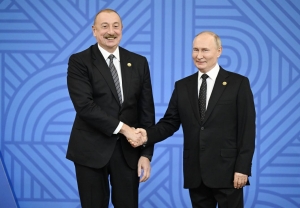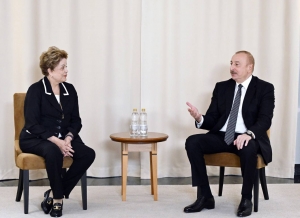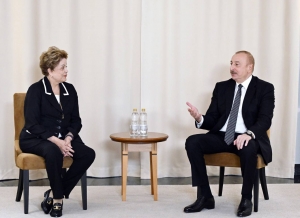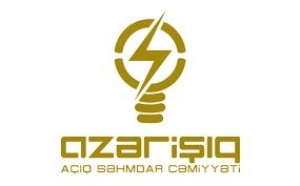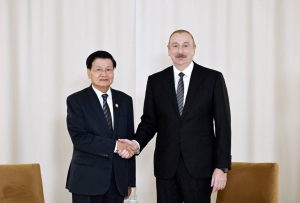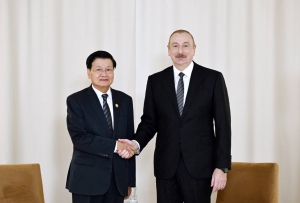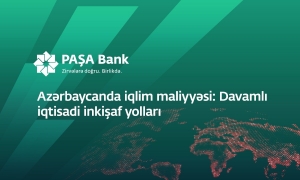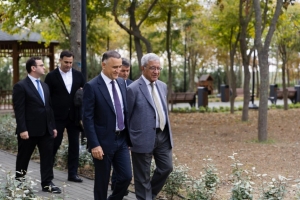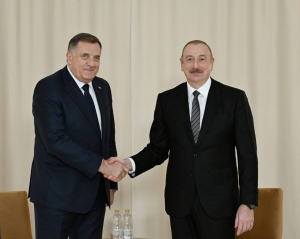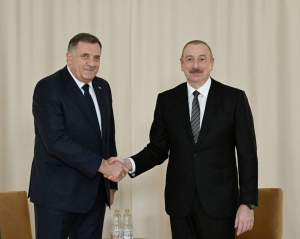Super User
Kazan hosted official reception on the occasion of the 16th BRICS Summit
On October 23, an official reception was held in Kazan on behalf of Vladimir Putin, President of the Russian Federation, in honor of the 16th BRICS Summit.
President of the Republic of Azerbaijan Ilham Aliyev attended the event.
“Caspian Energy Media” reports with reference to the official website of the President of Azerbaijan.
http://caspianenergy.site/caspianenergy.net/index.php/en/journal-archive-en/itemlist/user/43-superuser?start=3900#sigProGalleria5156fc4740
Ilham Aliyev met with President of New Development Bank in Kazan
On October 23, President of the Republic of Azerbaijan Ilham Aliyev met with Dilma Rousseff, President of the New Development Bank established by BRICS member states, in Kazan.
“Caspian Energy Media” reports with reference to the official website of the President of Azerbaijan.
В Казани состоялась встреча Ильхама Алиева с президентом Нового банка развития
23 октября в Казани состоялась встреча Президента Азербайджанской Республики Ильхама Алиева с президентом Нового банка развития, учрежденного государствами-членами БРИКС, Дилмой Руссефф.
Об этом сообщает “Caspian Energy Media” со ссылкой на официальный сайт главы Азербайджанского государства.
“Azərişıq” ASC-də genişmiqyaslı ağacəkmə aksiyası keçirilib
Cənab Prezident İlham Əliyevin ölkəmizdə bu il “Yaşıl dünya naminə həmrəylik ili” elan etməsi ilə əlaqədar “Azərişıq” ASC daha bir ağacəkmə aksiyasına start verib. Bu barədə “Caspian Energy Media“ya “Azərişıq” ASC-dən bildirilib.
Şirkətin əməkdaşları tərəfindən 20 oktyabr - Energetiklər Günü ilə əlaqədar Şirvan və Xaçmaz RETSİ-nə (Regional Enerji Satışı və Təchizatı İdarəsi) daxil olan rayonlarda minlərlə ağac əkilib. Ağaclar Azərişıq ASC-nin regional idarələri, yerli şəbəkələr, həmçinin Yarımstansiyalar ətrafında ayrılmış xüsusi ərazilərdə əkilir. Qarşıdakı günlərdə əkiləcək ağacların sayının 100 minə çatdırılması hədəflənib.
Qeyd edək ki, görülən işlər eyni zamanda gələn ay ölkəmizdə keçiriləcək COP29, Birləşmiş Millətlər Təşkilatının İqlim Dəyişikliyi Konfransına dəstək xarakteri daşıyır.
Ilham Aliyev met with President of Laos in Kazan
On October 23, President of the Republic of Azerbaijan Ilham Aliyev met with Thongloun Sisoulith, President of the Lao People's Democratic Republic, in Kazan.
“Caspian Energy Media” reports with reference to the official website of the President of Azerbaijan.
В Казани состоялась встреча Ильхама Алиева с Президентом Лаоса
23 октября в Казани состоялась встреча Президента Азербайджанской Республики Ильхама Алиева с Президентом Лаосской Народно-Демократической Республики Тхонглуном Сисулитом.
Об этом сообщает “Caspian Energy Media” со ссылкой на официальный сайт главы Азербайджанского государства.
“PAŞA Bank” “Azərbaycanda iqlim maliyyəsi: Davamlı iqtisadi inkişaf yolları” adlı konfrans keçirir
Ölkənin aparıcı korporativ maliyyə institutu “PAŞA Bank” “Azərbaycanda iqlim maliyyəsi: Davamlı iqtisadi inkişaf yolları” adlı konfrans keçirib. Bu barədə “Caspian Energy Media“ya “Paşa Bank“dan bildirilib.
23 oktyabr tarixində Bakıda baş tutan tədbir BMT-nin İqlim Dəyişikliyi üzrə Çərçivə Konvensiyasının Tərəflər Konfransının 29-cu sessiyasına (COP29) həsr olunub. Konfrans Azərbaycanın 2030-cu ilə qədər sosial-iqtisadi inkişafı üçün milli prioritetlər kontekstində iqlim maliyyəsi məsələlərinin əhəmiyyətinə fokuslanıb.
Konfransın işində energetika nazirinin müavini və COP29-un icraçı direktoru Elnur Soltanov, iqtisadiyyat nazirinin müavini Anar Axundov, BMT Qlobal Sazişinin Azərbaycan üzrə rəhbəri Samir Məmmədov, “Azerbaijan Green Energy Company”nin maliyyə direktoru və idarə heyətinin üzvü Xəyalə Nağıyeva, “Deloitte Azərbaycan”ın idarəedici partnyoru Nuran Kərimov, bir sıra beynəlxalq ekspertlər, 100-ə yaxın sahibkar və real sektorun təmsilçiləri iştirak ediblər.
Xatırladaq ki, “PAŞA Bank” 2023-cü ildə BMT Qlobal Sazişinin üzvü olub. Bankın “2024-2026-cı illər üçün Korporativ Sosial Məsuliyyət (KSM) strategiyası” həmin qlobal təşəbbüsün Dayanıqlı İnkişaf Məqsədlərinə (DİM) uyğun tənzimlənib. Həmin DİM-lərin arasında “iqlim dəyişikliyinə qarşı mübarizə” sahəsi xüsusi yer tutur və Bank cari strateji dövr ərzində bu istiqamət üzrə fəaliyyətini genişləndirmək niyyətindədir.
ADA Universiteti ilə “Veysəloğlu” şirkətinin tərəfdaşlığı uğurla davam edir
Tərəfdaşlıq sahələrinə təhsilə və sosial layihələrə dəstək, əməkdaşların ixtisaslarının artırılması, tələbə və şagirdlərin praktiki təcrübələrinin inkişafı üçün proqramların hazırlanması və iki tərəfin marağı əsasında müəyyənləşdirilən digər istiqamətlər daxildir. Bu barədə “Caspian Energy Media“ya “ Veysəloğlu Şirkətlər Qrupundan məlumat verilib.
Bu çərçivədə ADA Universitetinin rektoru Hafiz Paşayev və “Veysəloğlu Şirkətlər Qrupu”nun təsisçisi Aydın Talıbov ADA Məktəbində görüşərək təhsildə korporativ sosial məsuliyyət layihələrini müzakirə ediblər. Onlar tərəfdaşlığın uğurunu nəzərə alaraq bunun ADA Universiteti Fondu vasitəsilə növbəti illərdə də davam etdirilməsini qərara alıblar.Qeyd edək ki, “Veysəloğlu”nun hazırda 150 nəfər rəhbər əməkdaşı ADA Universitetinin İxtisasartırma Proqramının təqdim etdiyi “Liderlik Bacarıqlarının İnkişafı” proqramında iştirak edir.Görüşdə ziyalıların və mesenatların əməkdaşlığının təhsil tarixindəki rolu və bunun qorunub saxlanılmasının vacibliyi vurğulanıb.
Ilham Aliyev met with President of the Republic of Srpska of Bosnia and Herzegovina in Kazan
On October 23, the President of the Republic of Azerbaijan, Ilham Aliyev, met with Milorad Dodik, President of the Republic of Srpska of Bosnia and Herzegovina, in Kazan.
“Caspian Energy Media” reports with reference to the official website of the President of Azerbaijan.
Состоялась встреча Ильхама Алиева с Президентом Республики Сербской Боснии и Герцеговины
23 октября в Казани состоялась встреча Президента Азербайджанской Республики Ильхама Алиева с Президентом Республики Сербской Боснии и Герцеговины Милорадом Додиком.
Об этом сообщает “Caspian Energy Media” со ссылкой на официальный сайт главы Азербайджанского государства.




